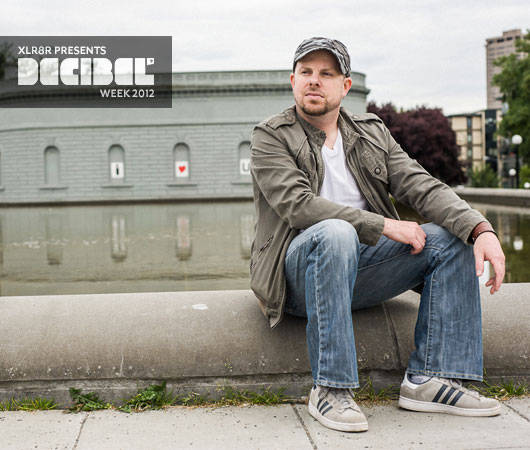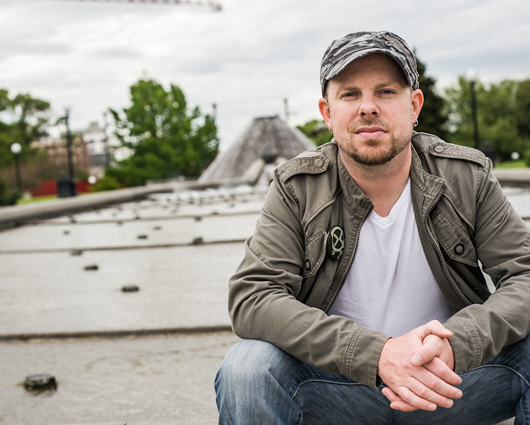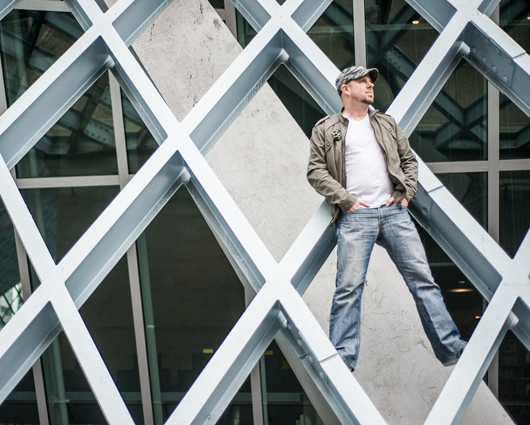Building Decibel: An Interview with Sean Horton
Seattle’s Decibel festival is set to get underway this week, marking the ninth edition of […]

Building Decibel: An Interview with Sean Horton
Seattle’s Decibel festival is set to get underway this week, marking the ninth edition of […]

Seattle’s Decibel festival is set to get underway this week, marking the ninth edition of the annual West Coast gathering for forward-thinking electronic music acts and devotees. Since its humble beginnings in 2004, Decibel has steadily grown in size and reach each year, and now stands as one of the US’ most comprehensive electronic-music festivals dedicated to showcasing underground and emerging talent. Still, Decibel’s rise to prominence is a somewhat unlikely story, built from a truly grassroots organization and run by music lovers and volunteers under the guidance and curatorial prowess of Seattle DJ/promoter Sean Horton, the festival’s founder and director. Throughout the week, XLR8R will be posting a series of Decibel-related content, and we figured that there would be no better way to begin than to chat with Horton himself, who provided some insight into what drives the festival and how it has managed to consistently evolve throughout the years.
What’s your background and how did you come up with the idea for Decibel?
I grew up in the Detroit area and was exposed to Detroit techno early on, so that planted the seed. I blame the early Plastikman Plus 8 parties for getting me into electronic dance music, and the need for experiencing well-curated events. I took that with me when I moved to Seattle in ’95. I was going to school for audio engineering and started promoting shows in college—throwing underground, multimedia-based events with lighting, videos, DJs, and live electronic music. Decibel didn’t come up as an idea until 2003, and it was largely influenced by two festivals I had been to earlier that year, Movement in Detroit and MUTEK [in Montreal]. Movement seemed to capture more of a party feel, while MUTEK had this intensely intellectual A/V component, and I really loved both of those atmospheres. If you look at Decibel, I think you’ll see a lot of similarities between both of those festivals in terms of the programming.
Would you say Decibel tries to find a balance somewhere between the two?
Yeah, that’s a fair estimate. I’d say right now, just based on the format, we’re more similar to MUTEK in the sense that we’re not a city-center type, outdoor festival. We’re club-based, and that’s by design. We prefer to have intimate club and theater experiences. There are so many amazing venues in Seattle, and I really wanted to showcase all these different places that I’d been booking for the past decade. But, in terms of the music, I think you’ll find that we’re bridging the gap between more accessible forms of electronic music. I don’t think you’d see MUTEK book DJ Shadow or Erykah Badu and those types of artists.
Is there a particular guiding principle or curatorial approach to the festival?
It’s very selfish really [laughs], but I do all the curating myself. I base it on music that I personally like, music that I would generally want to see in a live setting. There are a lot of DJs, bands, and performers out there that just don’t pull it off live, and for me, I usually don’t book an artist unless I’ve seen them perform and they would be a good fit within a particular showcase. There’s a particular way I try to build the energy throughout the night, with a starting point and end point for each showcase. There are also optical events that happen earlier in the day from 6 to 9 p.m., [before] the club showcases from 9 p.m. to 2 a.m., and then the after-hours from 2 to 7 a.m. I like to think of it as a natural progression between all three of those experiences throughout the day. That’s the way that I’ve always curated Decibel. It’s very personal because that’s the way I like to experience things.
Is that an idea you had from the onset, or is that something that’s developed as the festival has grown?
It’s been that way since the beginning. We’ve grown in terms of the size of the venues and the size of the festival—we started at 2,500 attendees the first year and had around 23,000 last year. We’ve grown substantially each year, but I’ve taken the same formula from year one and just expanded it. That goes for the education stuff as well, the DB conference aspect. With the conference, which goes from 12 to 6 p.m., you could almost make it a 5-day, 24-hour festival—not that I would recommend that. It’s more that there’s something for everyone, and there’s an activity to do at all parts of the day.

What do you think makes Seattle such an optimal place for a festival like this?
The tech industry is huge here, and that’s affected the subculture. Seattle’s subculture is newer, and over the past five years, we’ve seen a real resurgence in technological music, technological art, technological film—all of these things that have been influenced by companies like Boeing, Amazon, Microsoft, etc. All these incredibly gifted programmers and designers have come here and as a result, more people are producing and enjoying music that would maybe be considered “leftfield.” And Seattle is just a beautiful city. There are so many great parks and places to visit and it’s a tourist destination until about mid-October. Decibel comes right around the end of summer and beginning of fall, which is just a perfect time for Seattle; it serves as kind of an end cap to all the summer craziness.
You are approaching a decade-long run as a festival. Was there ever a turning point or a moment when you realized that Decibel was going to work for the long-run?
Yeah, our second year. In that first year, there was a lot of experimentation—we were working with a lot of venues for the first time and really still getting our feet wet with the community. In the second year, 2005, we more than doubled our audience and were able to expand to larger venues and still hit capacity at almost every showcase we did. To me, that was the year that really solidified Decibel as a brand in terms of festivals. It also was the year we saw a lot of people coming from outside of the city and Washington, and it’s been that way ever since. As of now, about 40% of our audience comes from outside the Northwest.
Given that, it still seems that the festival has a very grassroots, community-based feel to it. How do you accomplish that?
Well, a lot of that is from Decibel being a volunteer-based organization. Pretty much everyone in the organization—of which there are about a dozen core managers/directors—are all close friends with similar passions. We all have day jobs, so it’s truly a labor of love, and I think that’s part of what makes it unique—especially with a festival that’s grown to the size and magnitude that we have. There really isn’t much money at the end of the year. If we break even, we’re all patting each other on the back [laughs]. I’d love for us to be able to quit the day jobs and focus all of our attention on Decibel because I think we’d get a lot out of it, and be able to do even greater things from a creative perspective, but we’re just not there yet. At this point, I’m spending as much money as it takes to create a program that I feel is going to be just as good as the previous year. [We’re] constantly outdoing ourselves and growing substantially in the amount of artists and venues we work with. It is challenging, but we have a very talented team of consummate professionals that look at Decibel much the same way that I do—it’s a labor of love and gives them a chance to build something on an international level. That’s really what I intended Decibel to be, a community of people who learn from each other and grow from each other and then can eventually branch out and do their own thing.

Any favorite memories from Decibels past?
Every year there’s a handful of artists that capture the spirit of what’s happening that year, both in technology and music. Last year, being able to do the US debut of Amon Tobin‘s ISAM was monumental for us; bringing something on that level of complexity and innovation really captures the spirit of Decibel to me. I have to say, I thought it was really entertaining to see Deadmau5 in 2007. I think it was his first Northwest appearance, and he played a really banging techno set to a club that held just 600 people. Being able to bring artists in their infancy that then go on to become much more established, well-known acts is something that I pride myself on as a curator. Every year it seems we have a dozen or so artists that we book ahead of the curve—Flying Lotus played in 2005, Justice performed in 2006—all artists that were really in development at the time. Hopefully we can continue to book them too, but as electronic music’s popularity begins to rise, it’s becoming financially difficult for grassroots festivals like our own to continue to book artists that we had the pleasure of booking in the past. That’s my only concern, that with the continued success of electronic music, it will become a corporate endeavor just like anything else that becomes successful in North America, and maybe as a result you won’t see festivals like MUTEK, Communikey, and Decibel be able to survive.
And what acts are you looking forward to having at the festival this year?
DJ Shadow will be debuting a new set, and Entroducing… is definitely one of my top-five albums of all time, so I’m excited to see what he does. I’m very excited about John Talabot and Pional, which will be the Northwest debut of their live set. Matthew Dear will be performing his new material with his band for a full A/V set. We’ve been booking him since 2004, so I’d put that up on the top of my list too. And I’ll definitely be front and center for Actress at the XLR8R showcase too.

